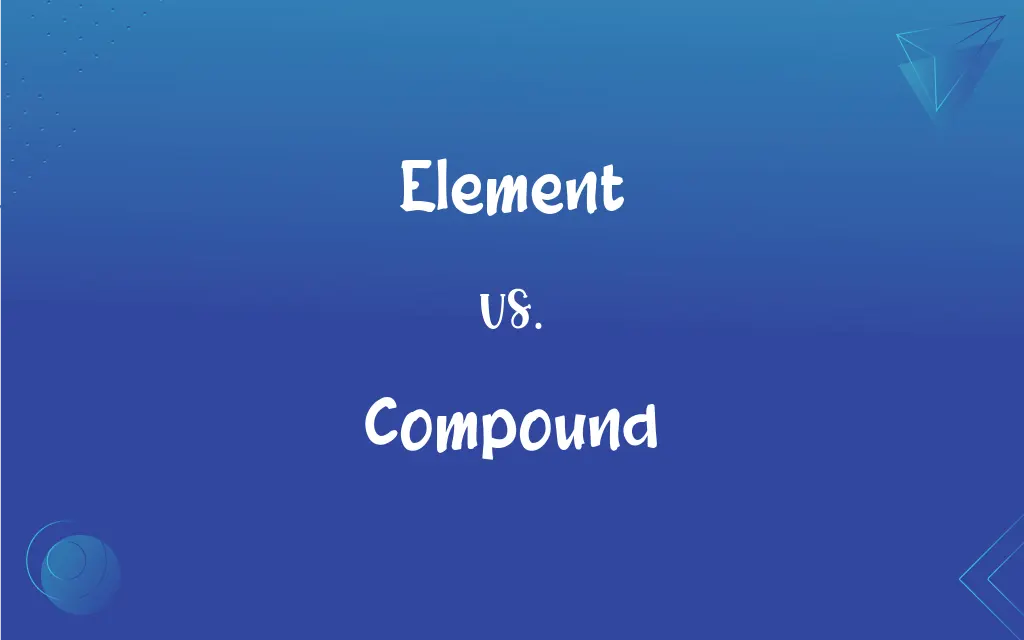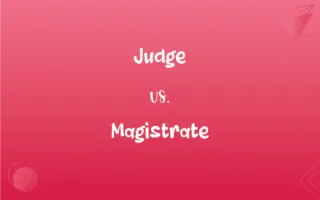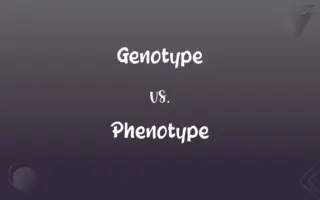Element vs. Compound: What's the Difference?
Edited by Janet White || By Harlon Moss || Updated on October 9, 2023
Element is a substance consisting of atoms with the same number of protons. Compound is a substance formed when two or more different elements combine in a fixed ratio.

Key Differences
The element represents a fundamental substance that cannot be broken down into simpler substances through ordinary chemical means. On the contrary, a compound illustrates a substance that forms when two or more different elements chemically bond together in a fixed ratio. Each entity showcases distinct characteristics in the realm of chemistry, embodying specific properties and behavior.
An element features a single type of atom, characterized by a unique number of protons in its nucleus. Unlike elements, compounds host atoms of various elements, chemically combined, exhibiting properties distinct from the elements constituting them. The inherent unicity of elements provides a stark contrast to the compositional diversity witnessed in compounds.
Elements, exhibiting purity in substance, highlight a fundamental unit in chemistry, while compounds, representing a chemical amalgamation, embody a more complex entity. Elements may stand alone, unfettered by the combination with other atoms, whereas compounds necessitate the bond between diverse elemental atoms, culminating in a singular substance with unique properties.
It’s imperative to note that elements adhere to a simplicity, symbolized by their presence on the periodic table, that contrasts with the compositional complexity inherent within compounds. The latter derive their characteristics not solely from the elements contained within but through the chemical bonds and structure that emerge through elemental combination.
In a nutshell, the simplicity and purity embedded within elements stand diametrically opposite to the complexity and varied composition found in compounds. While elements provide a foundational cornerstone in the realm of chemistry, compounds illustrate the infinite possibilities that arise when different elements chemically intertwine, creating new substances with novel properties.
ADVERTISEMENT
Comparison Chart
Constituent Units
Consists of one type of atom.
Comprises atoms of two or more elements.
Chemical Breakdown
Cannot be broken down into simpler substances chemically.
Can be broken down into simpler substances (elements) chemically.
Representation
Symbolized by a single symbol (e.g., O for oxygen).
Denoted by formulas indicating the constituent elements (e.g., H2O).
Physical Properties
Exemplifies specific, consistent properties.
Exhibits properties different from its constituent elements.
Occurrence in Nature
Can exist in a pure form.
Rarely found in a pure form, usually part of mixtures.
ADVERTISEMENT
Element and Compound Definitions
Element
An element is a pure substance consisting of one type of atom.
Hydrogen is an element found abundantly in the universe.
Compound
The ratio of elements in a compound is always fixed.
In the compound water, hydrogen and oxygen are always present in a 2:1 ratio.
Element
Elements are characterized by a specific number of protons.
Carbon, an element, always contains six protons.
Compound
Compounds can be broken down into simpler substances.
Electrolysis can break the compound water into hydrogen and oxygen.
Element
An element cannot be decomposed into simpler substances.
Gold, a precious element, cannot be broken down further via chemical means.
Compound
Compounds have a defined chemical formula that indicates the elements present.
Methane, a compound, has the chemical formula CH4, indicating one carbon and four hydrogen atoms.
Element
Elements can be solids, liquids, or gases at room temperature.
Mercury is a rare element that is liquid at room temperature.
Compound
A compound is formed by chemically combining two or more elements.
Water is a compound formed by combining hydrogen and oxygen.
Element
Elements occupy a unique place on the periodic table.
The element helium is located in the top right corner of the periodic table.
Compound
Compounds exhibit properties different from their constituent elements.
Sodium chloride (table salt) is a compound that is edible, unlike its constituent elements.
Element
A fundamental, essential, or irreducible constituent of a composite entity.
Compound
To combine so as to form a whole; mix
Tin was often compounded with lead to make pewter.
Element
Elements The basic assumptions or principles of a subject.
FAQs
What is an element in grammar?
In grammar, an element often refers to a fundamental component within a sentence, such as a subject, predicate, or clause.
Can "element" be used in different contexts?
Yes, "element" can refer to a component in various contexts, like a heating element in appliances or a fundamental principle in mathematics.
Is "element" a noun or a verb?
"Element" is a noun.
Can "element" mean a part of something?
Yes, it can refer to a component or part of a whole, e.g., "elements of a good story."
Give an example sentence using "element".
"Water is composed of the elements hydrogen and oxygen."
Can "compound" refer to a location?
Yes, "compound" can mean an enclosed area with buildings, such as a military compound.
How do you use "compound" in the context of eyesight?
"Compound" can describe a type of eye structure found in some animals, like insects, which have "compound eyes" made up of many small, repeating visual units or ommatidia.
What is an element in science?
An element is a substance composed of atoms with the same number of protons, and cannot be broken down into simpler substances through ordinary chemical means.
What is the plural form of "element"?
The plural form is "elements."
Can "element" refer to weather?
Yes, "elements" can refer to atmospheric forces, e.g., "exposed to the elements" means being outside and subjected to the weather.
Can "compound" be a verb?
Yes, as a verb, "compound" means to mix or combine, or to make a situation worse, e.g., "to compound a problem."
Provide a synonym for "compound" in a chemical context.
In a chemical context, a close synonym might be "mixture," though they have distinct scientific definitions.
What is a compound sentence?
A compound sentence contains at least two independent clauses, usually joined by a conjunction, e.g., "I cooked dinner, and my friend brought dessert."
Is "compound" used in finance?
Yes, in finance, "compound" refers to the process where the value of an investment increases because the earnings on an investment, both capital gains and interest, earn interest as time passes.
How is "element" pronounced?
It is pronounced as "EL-uh-muhnt."
What's a synonym for "element"?
"Component" can be a synonym depending on the context.
Give an example sentence using "compound".
"Water is a compound made up of hydrogen and oxygen."
How is "compound" pronounced?
It can be pronounced as "KOM-pound" (noun) or "kuhm-POUND" (verb) depending on its usage.
What is a compound word in English?
A compound word combines two or more words to function as a single unit of meaning, like "toothpaste" or "blackboard."
What is a compound in chemistry?
A compound is a substance formed when two or more elements are chemically bonded together.
About Author
Written by
Harlon MossHarlon is a seasoned quality moderator and accomplished content writer for Difference Wiki. An alumnus of the prestigious University of California, he earned his degree in Computer Science. Leveraging his academic background, Harlon brings a meticulous and informed perspective to his work, ensuring content accuracy and excellence.
Edited by
Janet WhiteJanet White has been an esteemed writer and blogger for Difference Wiki. Holding a Master's degree in Science and Medical Journalism from the prestigious Boston University, she has consistently demonstrated her expertise and passion for her field. When she's not immersed in her work, Janet relishes her time exercising, delving into a good book, and cherishing moments with friends and family.
































































